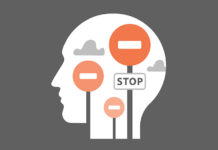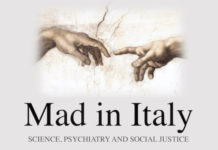Book Review: A History of Fatigue from the Middle Ages to the Present
Fatigue has always been in the background, infiltrating everywhere, ruling our choices and life paths—and the pharmaceutical industry has taken advantage.
Life-Enhancing Anxiety: Key to a Revitalized World
We need to experience less comforting (though potentially highly rewarding) edges if we are to lead more fulfilling individual and collective lives.
The Mental Health Industry Speaks Volumes About Our Society’s Priorities
An educated public has a much better chance of advocating from the grassroots for safe and effective treatments in the face of a pharmaceutical industry more interested in profits than people.
November 9, 2010
Bob--
Today, I saw a very friendly, highly intelligent (she has a PhD in economics) and overweight 34 year old woman for a refill of...
Trauma Blocks the Frontal Lobes – “Verbal Physiotherapy” Can Unblock Them
Trauma makes the speech centers of the brain shut down. This is why talking about abuse is so difficult: the words are blocked. If you reclassify trauma effects as trauma-strokes, and you adapt physiotherapy to take this clinical evidence into account, then you come up with Verbal Physiotherapy.
October 17, 2010
Bob--
A couple of very positive patient encounters yesterday:
• First, I saw a fit, vibrant 45 year old woman who presented for the first time...
Reclaiming Humanity at the Dawn of Posthumanism: Conversation with Darcia Narvaez
The postmodern zeitgeist of the past few decades encourages us to believe that we can endlessly reinvent ourselves untethered to our human biology. But the explosion of research on the microbiome reminds us that we are deeply embedded in an ecosystem that lives within us and around us, without which we cannot survive.
The Alternative to Drugs: The Real Treatment for Human Suffering
My opposition to psychiatric drugs is not just that they are harmful, dangerous, and destructive. That would be plenty motivation enough. And it is. But in addition, my profession, which I love and value, has been hijacked by the APA and Big Pharma. It is my goal to return psychiatry to its proper place - where good psychotherapy is understood to be the treatment for human suffering.
Mental Health Survival Kit, Chapter 2: Is Psychiatry Evidence Based? (Part 5)
The psychiatrists have fought really hard to hide the terrible truth that depression pills double the risk of suicide, not only in children but also in adults.
What Can We Learn from Alcohol? A Paradigm Shift in How We View Distress
The effects of alcohol—both positive and negative—have a lot to teach us about the biomedical view of psychiatric diagnoses and the drugs prescribed to treat them.
I Am “Pro-Healing”
Yoga helped me explore and reconnect with the body I’d abandoned and abused for years. My pain and sadness had me living exclusively in my mind, my body nothing more than a battleground for my inner wars. Through yoga and meditation, I slowly began to love myself again, learning to treat myself with care and respect. I felt a greater sense of self-awareness, and a sense of connection to something greater. This was a drastic contrast to the days when I felt as if god had forgotten about me, or like I was a mistake not meant for this world.
When HVN Ireland Meets HVN Athens
Chairperson of Hearing Voices Network Ireland Owen Ó Tuama on the joy and power of community for voice-hearers across the globe.
We Do Not Have Everything We Need
It’s healthier to figure out how to be with each other and care for each other than continue to engage in the destructive lie that we already have everything we need "inside ourselves."
The Sociological Study of Mental Illness: A Historical Perspective
Mental illness, as the eminent historian of psychiatry Michael MacDonald once aptly remarked, “is the most solitary of afflictions to the people who experience it; but it is the most social of maladies to those who observe its effects.” If psychiatry has typically, though far from always, focused on the individual who suffers from various forms of mental disorder, for the sociologist it is - naturally - the social aspects and implications of mental disturbance for the individual, for his or her immediate interactional circle, for the surrounding community, and for society as a whole, that have been the primary intellectual puzzles that have drawn attention.
My Personal Journey to Our Upcoming Empathic Therapy Conference
Our newest conference this coming April in Michigan is the high point of a transition that my wife Ginger and I have been making for several years. The origins of the change go much further into the past to sixty-one years ago in 1954 when I was an eighteen-year-old college freshman at Harvard and a friend invited me to join him as a volunteer on the wards of Metropolitan State Hospital. I was majoring in American History and Literature, with little thought of becoming a psychologist and no thought whatsoever of being a medical doctor and a psychiatrist.
How Psychologists Meet the Needs of the “Power Structure”: A Talk at the Psychologists...
All power structures throughout history have sought to use groups of people, especially among so-called professionals, who will control the population from rebelling against injustices. Power structures have used clergy—that’s why clergy who cared about social justice and who were embarrassed by their profession created “liberation theology.” Power structures have certainly used police and armies, as has been done throughout American history to try to break the U.S. labor movement. And the U.S. power structure now uses mental health professionals to manipulate and medicate people to adapt and adjust and thereby maintain the status quo, regardless of how insane the status quo has become.
Listening to the Voiceless Citizens
Just this morning CNN reported that 3 men were arrested over plans to travel from N.Y. to join ISIS and one of them posted online about his plans to assassinate the President. Cyberspace and social media are the platforms from which terrorists speak, express their ideas and exert powerful influences over some individuals in this and other countries. The voices of terrorists are clearly compelling and appealing. Their voices are being responded to in dangerous ways.
Fernando de Freitas: A “Dear Friend” Who Was a Warrior for Radical Change
Fernando de Freitas, co-founder of Mad in Brasil, passed away January 30. He had devoted his professional life to seeking to transform psychiatric care in Brazil and beyond.
Power Means Never Having to Say You’re Sorry
I wonder how this system would be changed if, tomorrow, every provider (past and present) woke up and made it their mission to find someone who’s been through their services in one way or another, and told them they were genuinely sorry for something specific that had happened during that time.
Yes, the Tide is Turning Against Psychiatry
The suggestion embedded in this article’s title seems counter-intuitive. How could the tide be turning on psychiatry when the institution has never been so strong? And indeed indicators of its growing strength and tenacity are all around us. The exporting of its model to the global south via the World Bank, the emergence of outpatient committal, the explosion of funding for psychiatric research. Daily are there calls for most aggressive “detection” and “treatment.” And the mainstream press has never been more closed to truly foundational critiques. That acknowledged, let me suggest that such intensification is common when an old system is in the early days of crumbling.
Why Mad in Italy?
The Italian mental health system, like the majority of them around the world, struggles with accepting a model based on principles of Recovery, which highlights individual and communal mental health needs, social determinants of emotional distress, integration of physical and psychological care and quality of life.
Much of U.S. Healthcare Is Broken: How to Fix It (Preface)
Medical practitioners base their practice on clinical experience, rather than the sound published health research, which they distrust.
Dualism and the Mind-Body ‘Problem’
The proposal that there are differences in the way we understand the human body and human activity seems to make people particularly uneasy. It is often misunderstood as illustrating the ‘mind-body problem,’ and held up as an example of the great crime of ‘dualism.’
Dialogical Recovery from Monological Medicine
Open Dialogue* has created a great stir since its public introduction to the United States two years ago through Robert Whitaker's book, Anatomy of...
Yogurt Cooperative in Spain Provides a Different Form of Help: Meaningful Work
Every one of the Fageda Cooperative’s 300 workers - from milking shed to packing plant - will tell you that this cooperative makes the finest yogurt in all Spain, if not in the world. Last year, they made 1.4 million yogurts every week. In Catalonia, only Nestle and Danone sell more. But Fageda isn’t in business to make yogurt. For over 30 years, its sole mission has been to provide fully-paid, flexible employment to anyone from the region diagnosed with a mental health problem but who still wants to work.























